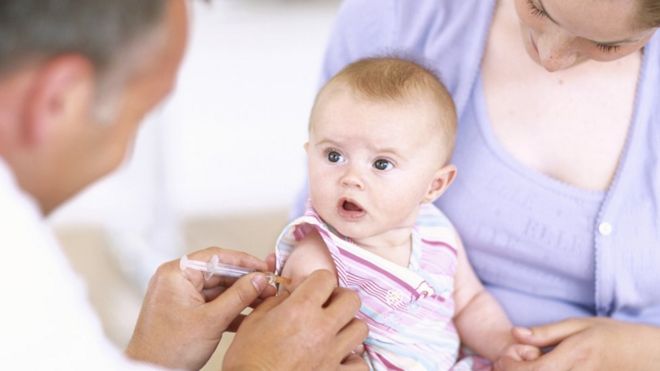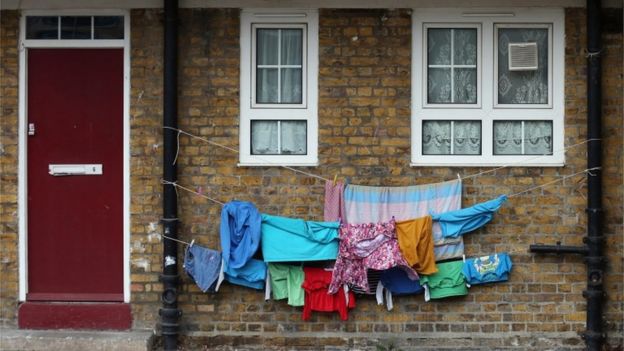Parts of London have higher TB rates than Iraq or Rwanda

Science Photo Library
Eight London boroughs do not offer BCG vaccination, though it is recommended for all newborns in the capital
Parts of London have higher rates of tuberculosis than Rwanda or Iraq, a report from the London Assembly says.
A third of London’s boroughs suffer from high rates of TB, with more than 40 incidents per 100,000 people.
Some wards in Brent, Ealing, Harrow, Hounslow and Newham have rates of more than 150 per 100,000.
The report said prisoners, homeless people, people with substance abuse issues, refugees and migrants were particularly at risk.
Although the BCG vaccination against TB is recommended for all newborn babies in London, eight of the 24 boroughs do not offer it.
The rate of infection among UK-born Londoners has risen, while among the non-UK-born it has fallen – and the report said it would be wrong to assume TB was a disease of migrants.
Prevention ‘poor’
The borough with the highest rate per 100,000 people was Newham, with 107 cases. Figures for 2013 from the World Health Organisation showed in Rwanda the figure was 69, while in Iraq it was 45.
Algeria and Guatemala also had a lower incidence than the capital, the reports points out.
The average rate per 100,000 in the UK as a whole was 13.
London’s TB problem
A few strains of the disease are now resistant to antibiotic treatment and the cost of treating them can be as high as £500,000 per patient.
Why is London worse than the rest of the country?
Reasons include:
- Poor housing, chronic ill health and poor nutrition trigger latent TB into active TB
- Specific health complaints, including diabetes and HIV, weaken the immune system – the capital has high rates of both
- More than 80% of London TB cases occur in people who were born abroad. It is not known how many people arrive with latent TB and it is not deemed cost-effective to screen for it
- Low levels of awareness and late diagnosis by GPs
Source: Tackling TB in London
The London Assembly is calling on Mayor Boris Johnson to educate Londoners about TB, saying many people in the capital are unaware of how TB spreads.
More than half of those surveyed thought spitting could transmit it. In fact, TB is usually spread by close and prolonged contact with someone who is coughing and sneezing.

Science Photo Library
Bacteria used in the BCG vaccination, which gives good protection against childhood TB
“Prevention is poor and awareness low, even among the medical profession itself,” said Dr Onkar Sahota, the chairman of the Assembly’s health committee.
He described the treatment for drug-resistant strains as “expensive, complicated and terribly gruelling”.
“The quality of care for TB sufferers also varies across the capital,” he said.
About tuberculosis
- About seven Londoners develop TB symptoms (which include persistent coughing, weight loss and tiredness) every day
- Two billion people worldwide are thought to have latent TB infection, but many will never develop active TB unless their immune systems are compromised
- TB patients must take antibiotics daily for six months
- Those with drug-resistant strains are prescribed an average of 19 pills a day – 14,000 altogether
- They can have severe, life-altering side effects, including nerve damage, kidney and liver impairment, and loss of sight or hearing
The Assembly said it was “unacceptable that children are put at risk of developing a potentially life-threatening illness on the basis of which borough they are born in” and that offering BCG would not cost boroughs more.
Prisoners were among the groups highlighted as being particularly at risk, but TB screening in prisons is not effective enough and the capital’s approach to tackling the disease is “fragmented”, the report says.
The report calls on the Mayor and the Greater London Authority to fund a new “find and treat” service and use the Team London volunteer network as TB community health champions.
The Mayor’s office said he remains “committed to tackling TB” although recent figures show in the three years to 2014, the number of people infected in the capital fell.
He is “assured by Public Health England that every effort continues to be made to prevent and treat the disease in London”, a statement said.
Londra’nın yoksul bölgelerindeki tüberküloz oranı Irak ve Ruanda’dan yüksek
Londra’nın yoksul bölgelerindeki tüberküloz oranının Ruanda veya Irak’taki tüberküloz oranından yüksek olduğu bildiriliyor.

BBC‘nin haberine göre Londra’nın kimi kesimlerindeki tüberküloz oranın Ruanda ve Irak’taki tüberküloz oranının üzerinde. Londra’nın üçte birinin 100 binde 40’ın üzerinde tüberküloz oranına sahip olduğu bildirilirken, oranın kimi yerlerde 100 binde 150’yi aştığı bildiriliyor.
Özellikle riskli grupların mahkumlar, evsizler, madde bağımlıları, mülteciler ve göçmenler olduğu bildiriliyor.
İngiltere doğumlular arasında tüberküloz oranının artmakta olduğu görülürken, oranın göçmenlar arasında düşmekte olduğu ve bu sebeple sorunun “göçmen hastalığı” olarak düşünülmemesi gerektiği söyleniyor.
Önleyici müdahalelerin de yapılmadığı ve hastalığın yayılmasını engellemek için ciddi bir çaba gösterilmediği aktarılıyor.





